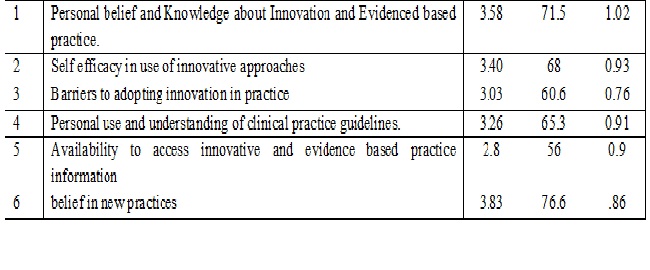Assessment of attitude towards innovative approaches related to nursing care in intensive care units among staff nurses of P.B.M. Hospital, Bikaner
Abstract
Back ground: Innovation is process of developing new approaches, technologies and ways of working. It can apply to tools and technologies and processes, or the way anorganization or an individual behaves works or acts. Nursing care is changing in the face of technology, and innovation is the most important tool for improving the quality of care of community. Creativity and innovation are needed to continue the expression of genuine care and concern, not only through human contact, but also through the use of technology.Technology and its increased use in the healthcare field is constantly evolving and changing. The attitudes of the staff nurses can impact the successful use of that technology and thereby improve not only competency, but also job satisfaction, quality of nursing care.
Objectives: 1. To assess the attitude towards innovative approaches related to nursing care in Intensive Care Unit (ICUs) among the staff nurses working in PBM hospital. 2. To associate the attitude towards innovative approaches among staff nurseswith selected background variable.3. To conduct the seminar on innovative approaches related to nursing care inICUs.
Materials and Methods: Using non experimental study with descriptive design data were collected from 100 staff nurses working in ICUs. Likert type scale was used to collect data on attitude and structured questionnaire for back ground variable. Analysis of data was done using descriptive and inferential statistics.
Results: Analysis of data showed statistically significant association between attitude towards innovative approaches and professional education and participation in continuing education among nurses. Study findings depicts positive attitude of nurses towards innovation in nursing care, whereas nurses working in ICUs have limited access to innovative and evidence based information.
Conclusion: The study concluded that the attitude of staff nurses towards innovation in nursing care need to be enhanced by conducting educational training program and seminar on innovation in nursing care. There must be adequate access to information on innovative and evidenced based practice in nursing care.
Downloads
References
Nurses leading care innovation. Geneva: International council of nurses. 2009
Sanders C1, Rogers A, Bowen R, et al. Exploring barriers to participation and adoption of telehealth and telecare within the Whole System Demonstrator trial: a qualitative study. BMC Health Serv Res. 2012 Jul 26;12:220. doi: https://doi.org/10.1186/1472-6963-12-220.
Taylor J, Coates E, Brewster L, et al. Examining the use of telehealth in community nursing: identifying the factors affecting frontline staff acceptance and telehealth adoption. J AdvNurs. 2015 Feb;71(2):326-37. doi: https://doi.org/10.1111/jan.12480. Epub 2014 Jul 29.
AbuRuz ME, Hayeah HA, Al-Dweik G, et al. Knowledge, Attitudes, and Practice about Evidence-Based Practice: A Jordanian Study.HealthSci J. 2017, 11: 2. DOI: https://doi.org/10.21767/1791-809X.1000489
Farokhzadian J, Nayeri ND, Borhani F, et al. Nurse leaders' Attitudes, Self-Efficacy and training Needs for Implementing Evidence-Based Practice: Is It Time for a Change toward Safe Care? Br J Med Med Res. 2015;7(8):662-671. Epub 2015 Mar 17.
FathimathShifaza, David Evans, and Helen Bradley. Nurses’ Perceptions of Barriers and Facilitators to Implement EBP in the Maldives. Hindawi Publishing Corporation Advances in Nursing Volume 2014, doi: http://dx.doi.org/10.1155/2014/698604
Magda M. Mohsen1, NahlaAshour Safaan1, Omayma M. Okby. Nurses’ Perceptions and Barriers for Adoption of Evidence Based Practice in Primary Care: Bridging the Gap American Journal of Nursing Research, 2016, Vol. 4, No. 2, 25-33. doi: http://pubs.sciepub.com/ajnr/4/2/1.
Quiros D, Lin S, Larson EL. Attitudes toward practice guidelines among intensive care unit personnel: a cross-sectional anonymous survey. Heart Lung. 2007 Jul-Aug;36(4):287-97. DOI: https://doi.org/10.1016/j.hrtlng.2006.08.005.
Kipturgo MK, Kivuti-Bitok LW, Karani AK, et al. Attitudes of nursing staff towards computerisation: a case of two hospitals in Nairobi, Kenya. BMC Med Inform DecisMak. 2014 Apr 29;14:35. doi: https://doi.org/10.1186/1472-6947-14-35.
Tubaishat A. An investigation into the attitudes of nursing students toward technology. J Nurs Res. 2014 Jun;22(2):119-25. doi: https://doi.org/10.1097/jnr.0000000000000029.
Chang-Chiao Hung et al., Effects of simulation-based learning on nursing student competences. J Nurs Care 2016, 5:4(Suppl). doi: http://dx.doi.org/10.4172/2167-1168.C1.020
Ofi B, Sowunmi L, Edet D, et al. Professional nurses' opinion on research and research utilization for promoting quality nursing care in selected teaching hospitals in Nigeria. Int J Nurs Pract. 2008 Jun;14(3):243-55. doi: https://doi.org/10.1111/j.1440-172X.2008.00684.x.
Fen Zhou, YufangHao, Hong Guo, Hongxia Liu. Attitude, Knowledge, and Practice on Evidence-Based Nursing among Registered Nurses in Traditional Chinese Medicine Hospitals: A Multiple Center Cross-Sectional Survey in China. Evidence-Based Complementary and Alternative Medicine. Volume 2016, Article ID 5478086, doi http://dx.doi.org/10.1155/2016/5478086.
Masoumeh Shohani1, VahidZamanzadeh. Nurses' Attitude towards Professionalization and Factors Influencing It. Journal of Caring Sciences, 2017, 6(4), 345-357 doi: https://dx.doi.org/10.15171%2Fjcs.2017.033
Black AT, Balneaves LG, Garossino C, et al. Promoting evidence-based practice through a research training program for point-of-care clinicians. J Nurs Adm. 2015 Jan;45(1):14-20. doi: https://dx.doi.org/10.1097%2FNNA.0000000000000151.



 OAI - Open Archives Initiative
OAI - Open Archives Initiative


